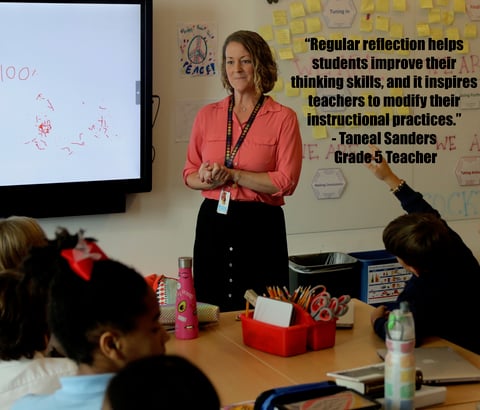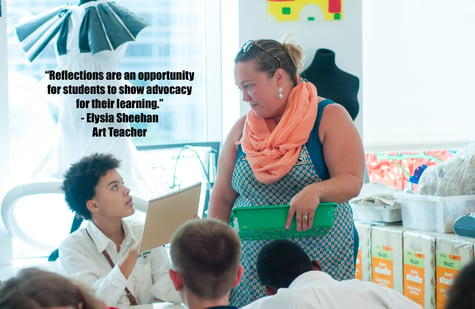HOW STUDENT REFLECTION CAN BOOST LEARNING
![]()
![]() Most of us can remember instances from our school days when we worked feverishly to complete assignments or projects by the due date. But after handing them in, how many of us could have explained exactly why we put in all that work? How many of us could explain what we learned?
Most of us can remember instances from our school days when we worked feverishly to complete assignments or projects by the due date. But after handing them in, how many of us could have explained exactly why we put in all that work? How many of us could explain what we learned?
 The challenge for teachers is to inspire students to be more engaged with the work they do, so that it has a lasting impact on them as thinkers and problem solvers. An important tool in this effort, one being embraced by a growing number of schools, is student reflection.
The challenge for teachers is to inspire students to be more engaged with the work they do, so that it has a lasting impact on them as thinkers and problem solvers. An important tool in this effort, one being embraced by a growing number of schools, is student reflection.
At GEMS World Academy Chicago, a premier private school, student reflection is embedded in the academic program from pre-K through high school. Students are called upon regularly to think about their completed work, explain the choices they made and set goals for the future.
Reflecting on their work in this way strengthens students' connection to the material being studied and teaches them to be active and critical learners, GEMS leaders say.
"Students build self-awareness and emotional insight through reflection," said Ann Tolley Jones, school counselor. "When they reflect on the 'why' of it all, they are able to think more critically moving forward and make healthier, more authentic decisions in their personal and social lives."
Depending on grade level, student reflections at GEMS range from a few sentences to a page-long examination of the student's goals and process. Here is an excerpt from an eighth-grader's reflection on a work of art about media manipulation that she created as part of a unit on propaganda:
"My propaganda art addresses media influence in young lives and how it shapes our future. My goal isn't to tell you that CNN is not a credible source, or that everyone should listen to The New York Times, but for the audience to be aware of faulty news and the biased perspectives of each source...I wanted to implement the idea of having media implanted in your head."
Marjorie Blettry, who teaches Spanish and French at GEMS, said she has been struck by how insightful her students are in their reflections. They evaluate themselves honestly, she said, and demonstrate a commitment to pursuing excellence.
Here's an example of a reflection that a language student submitted to Ms. Blettry:
"I can speak with an appropriate voice, but sometimes my words slur together and I trip over my tongue. I have a generally good accent, but when speaking faster, my enunciation becomes less prominent."
 "Student reflections are an important asset when teaching a language," Ms. Blettry said. "They clue both student and teacher in to how the learning process is going, and what needs to be done for improvement."
"Student reflections are an important asset when teaching a language," Ms. Blettry said. "They clue both student and teacher in to how the learning process is going, and what needs to be done for improvement."
GEMS' commitment to student reflection, which flows from the International Baccalaureate curriculum framework in place at the school, is backed by research.
A recent study conducted at the University of Texas at Austin showed that when a student takes the time to think about what she's learned from previous work, the brain is engaged in ways that can boost future learning. Similarly, researchers at Oakland University found that integrating reflective work into writing courses improved student learning, enhanced assessment and helped with teachers' professional development.
By encouraging students to be reflective about what they learn — to answer the "Why?" question — GEMS is helping them become confident critical thinkers and global leaders.
• Related reading: A different take on parent-teacher conferences
